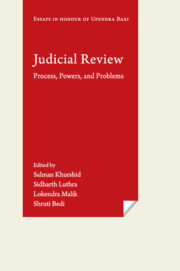Book contents
- Frontmatter
- Contents
- Foreword
- Editors' Note
- Introduction
- 1 The Inadequacy of Judicial Enforcement of Constitutional Rights Provisions to Rectify Economic Inequality, and the Inevitability of the Attempt
- 2 The Interplay of Law and Politics in India
- 3 Beating the Backlog: Reforms in Administration of Justice in India
- 4 Judicial Review: Perspectives and Reflections for the Twenty-First Century
- 5 When ‘Creeping Jurisdiction’ Goes Awry: The Social Action Litigation to Ban Surrogacy
- 6 Judicial Review and the Democratic Judge
- 7 Judicial Review: A Tool to Shape Constitutional Jurisprudence
- 8 The Baxian Bioscope on Indian Judicial Process
- 9 Judicial Activism, Courts, and Constitutional Revolutions: The Israeli Case
- 10 Democracy, Constitution, and Judicial Review: A Critique
- 11 A Minor Jurisprudence of Pathos: Upendra Baxi as Teacher and Writer
- 12 The Need for Reinventing the Supreme Court as a Constitutional Court
- 13 Appointment of ‘Distinguished Jurists’ as Judges in the Supreme Court of India: A Critical Analysis
- 14 Judicial Dissent and Judicial Review: A Functional Analysis
- 15 The Power of Judicial Review: Judicial Chutzpah or Judicial Desideratum
- 16 Judicial Review of Legislations by Tribunals in India: Law, Problems, and Perspectives
- 17 Criminalization of Membership of Terrorist Organizations in India and the United States of America: Human Rights Concerns
- 18 Article 142 of the Indian Constitution: On the Thin Line between Judicial Activism and Restraint
- 19 Sketching the Limits of Article 142 of the Constitution of India: A Constitutional Necessity
- 20 Constitutional Morality and Judges of the Supreme Court
- About the Contributors
- Index
11 - A Minor Jurisprudence of Pathos: Upendra Baxi as Teacher and Writer
Published online by Cambridge University Press: 23 January 2020
- Frontmatter
- Contents
- Foreword
- Editors' Note
- Introduction
- 1 The Inadequacy of Judicial Enforcement of Constitutional Rights Provisions to Rectify Economic Inequality, and the Inevitability of the Attempt
- 2 The Interplay of Law and Politics in India
- 3 Beating the Backlog: Reforms in Administration of Justice in India
- 4 Judicial Review: Perspectives and Reflections for the Twenty-First Century
- 5 When ‘Creeping Jurisdiction’ Goes Awry: The Social Action Litigation to Ban Surrogacy
- 6 Judicial Review and the Democratic Judge
- 7 Judicial Review: A Tool to Shape Constitutional Jurisprudence
- 8 The Baxian Bioscope on Indian Judicial Process
- 9 Judicial Activism, Courts, and Constitutional Revolutions: The Israeli Case
- 10 Democracy, Constitution, and Judicial Review: A Critique
- 11 A Minor Jurisprudence of Pathos: Upendra Baxi as Teacher and Writer
- 12 The Need for Reinventing the Supreme Court as a Constitutional Court
- 13 Appointment of ‘Distinguished Jurists’ as Judges in the Supreme Court of India: A Critical Analysis
- 14 Judicial Dissent and Judicial Review: A Functional Analysis
- 15 The Power of Judicial Review: Judicial Chutzpah or Judicial Desideratum
- 16 Judicial Review of Legislations by Tribunals in India: Law, Problems, and Perspectives
- 17 Criminalization of Membership of Terrorist Organizations in India and the United States of America: Human Rights Concerns
- 18 Article 142 of the Indian Constitution: On the Thin Line between Judicial Activism and Restraint
- 19 Sketching the Limits of Article 142 of the Constitution of India: A Constitutional Necessity
- 20 Constitutional Morality and Judges of the Supreme Court
- About the Contributors
- Index
Summary
The minor … gets cast aside, overlooked, or forgotten in the interplay of major chords. This is the downside of the minor, but also its strength: that it does not have the full force of a preexisting status, of a given structure, of a predetermined metric, to keep it alive. It is out of time, untimely, rhythmically inventing its own pulse.
—Erin Manning‘Testimonial to a Lack’
What is Upendra Baxi's contribution to jurisprudence in India? If one were to engage in a playful speculation about the ways in which lawyers will answer this question, what might some imaginative responses yield? If you are a practising lawyer—I am not, so this is a hazardous guess—he will be considered a respected legal academic who has written a lot on the Constitution and the Supreme Court, but hopelessly theoretical for a practitioner's use. If you are a judge (am I bordering on contempt?)—his stature would invite the salutation ‘brother’, but he will also be considered too much of a polemicist who will tear through the myth of judicial propriety. If you are a practising lawyer of the human rights kind—which also I am not, but can risk a more favourable guess—he is a key figure who extols the power of social action litigation, and has encouraged many law students (who have been either taught by him or have read or heard him) to not go down the path of taking up a corporate law job but to dedicate themselves to litigating against the impunity with which the state and corporations perpetuate violence against the poor, despised, and suffering. If you are an activist (which I have been in a past life with some remaining traces, so can speak with contingent authority), Baxi's own activism offers strategies for how law can be used by lawyers and people's movements for social transformation, while you continue to subject law to ethical interrogation.
If you are a legal academic (which is the skin that I have lived in for a fair bit of time now), he is a Dumbledoreesque figure2 for those few in India who engage in what can broadly be called critical legal scholarship or legal theory on the left or activist scholarship.
- Type
- Chapter
- Information
- Judicial Review , pp. 202 - 224Publisher: Cambridge University PressPrint publication year: 2020



